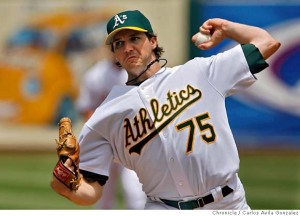An A’s versus Pirates World Series is every baseball fan’s wet dream. It’s David vs. David.
Hey, baseball fans, you’ll get this one: It would be like a World Series of the 1987 Twins and 1969 Mets.
Football fans: It would be like the 1968 Jets against the 2001 Patriots.
Basketball fans: It would be like the 1995 Rockets against the 2004 Pistons.
Hockey and soccer fans: It would be like … I have no idea.
How cool would an A’s / Pirates World Series be? I really have little else to say except this, but it’s mid-September and it’s still very possible. The A’s are pulling away with the AL West lead and the Pirates can still catch the Cardinals in the NL Central and if not, they’ll take the wild card pending a historic collapse.
Yes, this matchup is highly unlikely in the land of unnecessary-playoffs-that-don’t-really-determine-the-best-team-of-the-year, but that’s the wonderful thing about bullshit playoffs – sometimes they allow a more fun team to win it all (see: 1987, 1988, 1990, 2003, 2004, 2010 and 2011).
Pirates
They haven’t had a winning season since Barry Bonds was skinny and Americans where thinking they were done with those Iraqis after Desert Storm. Pittsburgh is home to the greatest ballpark on the planet and baseball icons (and actual good men) Honus Wagner, Roberto Clemente and Willie Stargell.
A’s (a.k.a. the Athletics)
Everyone has read Moneyball and if you haven’t, shame on you. Oakland is not exactly following the same formula (as everyone copied it after they caught on), but it’s still finding talent in strange places and winning games with a (for the most part) unknown lineup. They play in the worst 100% outdoor ballpark and have no sign of changing venues.
These teams barely avoided each other in the seventies with the Pirates participating in and winning the ’71 and ’79 series while the A’s did the same with ’72, ’73 and ’74.
Baseball Commissioner Bud Selig would not agree with this blog as an Oakland/Pittsburgh World Series would likely destroy television ratings. The fair-weather fan would not tune in. Although, I believe any fan will tune in should the game reach Game 6 or 7, especially if the previous games were good (see 1991 and 2011).
I don’t care about ratings. Major League Baseball will be fine without a Yankees / Dodgers World Series. An Oakland versus Pittsburgh Fall Classic is what the game needs. It may not get the ratings, but it will provide the stories that will last and that is exactly what baseball is known for.


